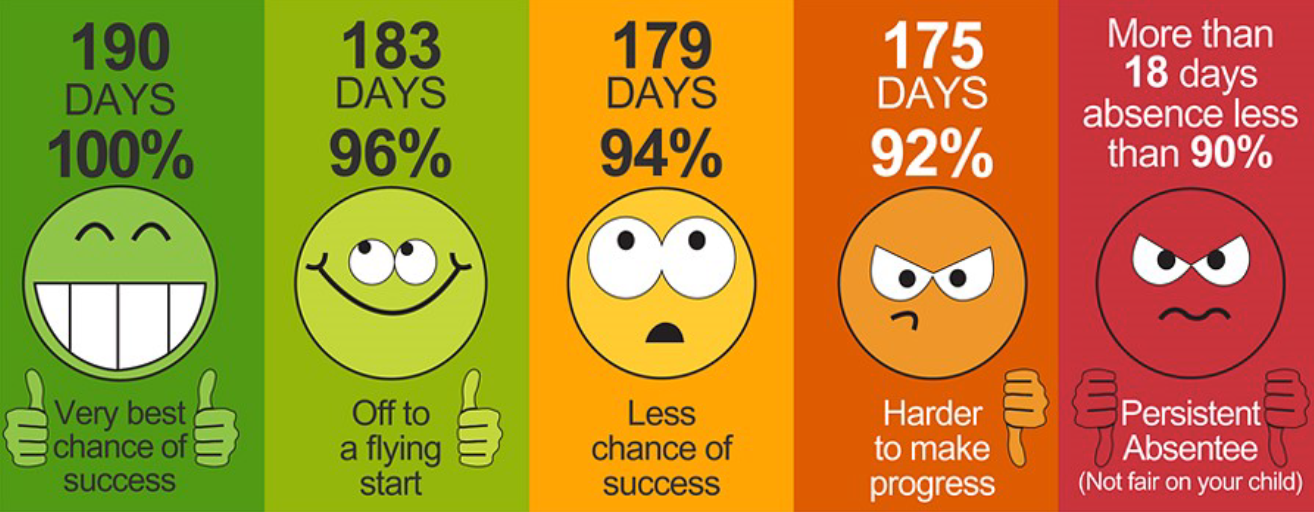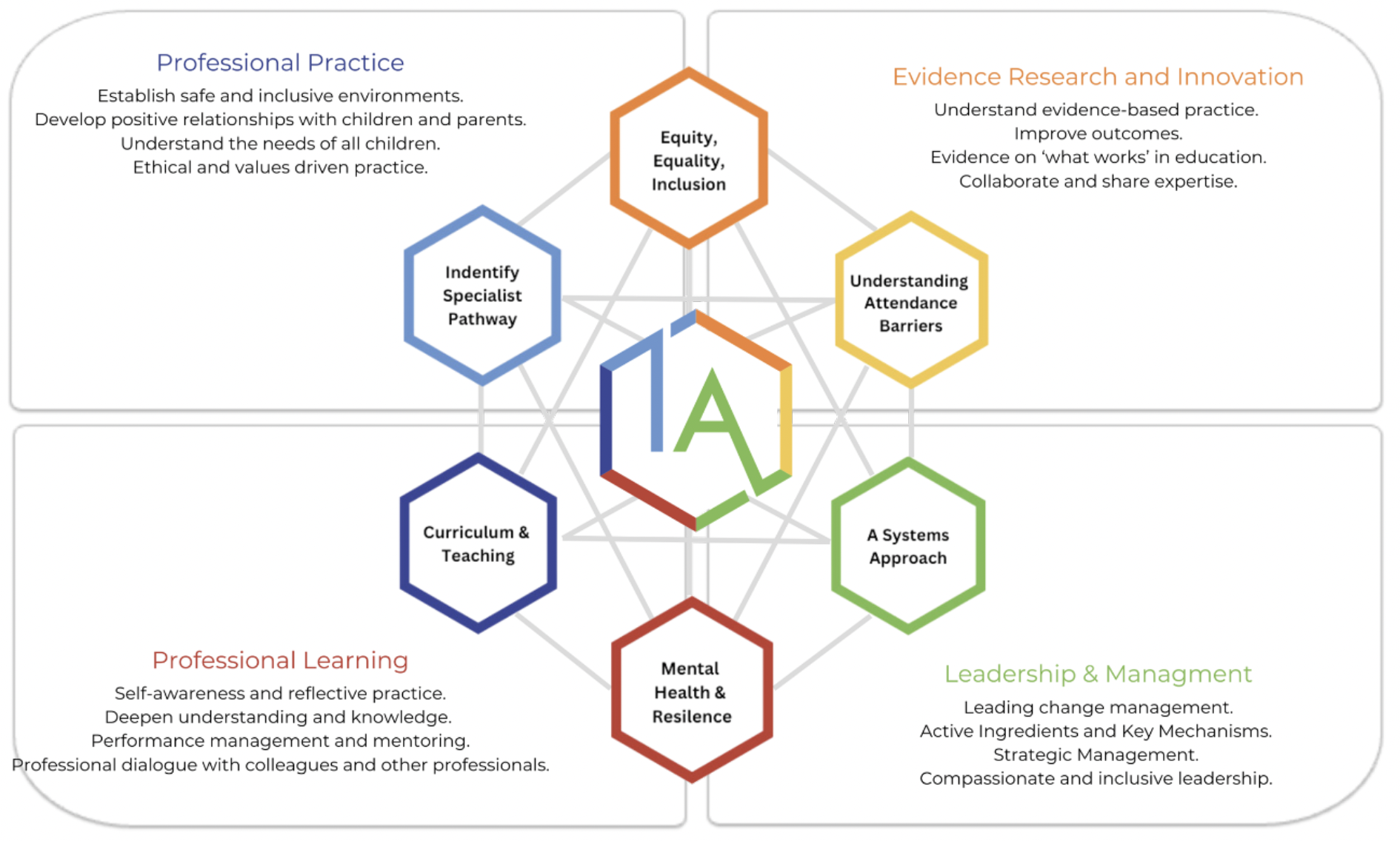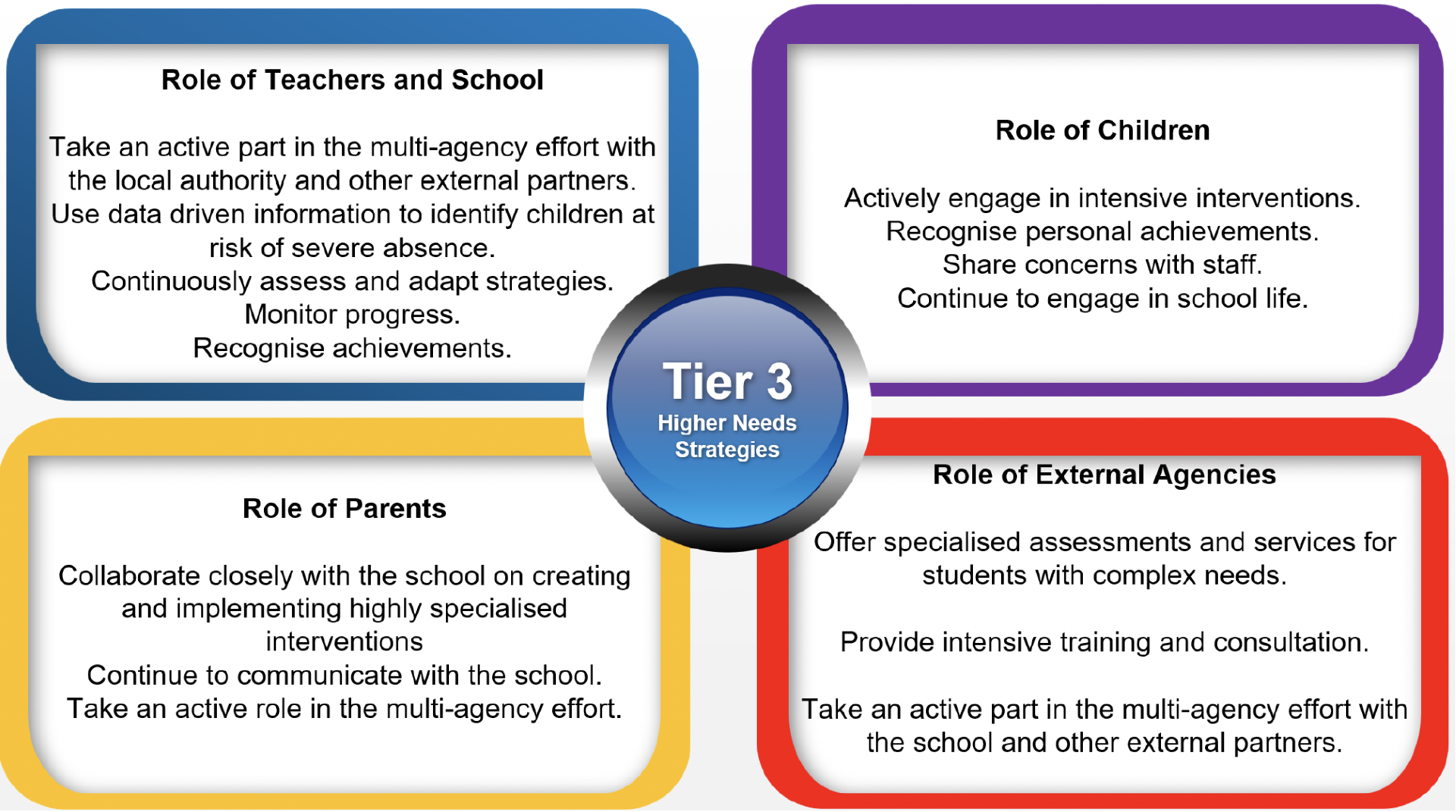
Kineton C of E Primary School
Attendance


Punctuality
School starts promptly at 8.40am. School gates will be opened at 8.35am and doors to all phases of the school will be opened by staff between 8.40am and 8.45am. If a child arrives at school after 8.45am without prior arrangements having been agreed, he/she will be deemed late. Registers close at 9.15am and arrival at school after this time, without prior approval or extenuating circumstances, will be recorded as an unauthorised absence.
The Importance of School Attendance
School attendance is not merely a requirement but a fundamental pillar of education. It plays a pivotal role in shaping academic success, personal growth, and future prospects, making it an indispensable aspect of any educational system.
- Academic Achievement: regular attendance directly correlates with academic success. Children who attend school consistently are more likely to keep up with the curriculum, perform better in exams, and improve their life outcomes.
- Knowledge Acquisition: school is where children acquire knowledge and skills that are crucial for their personal and professional growth. Missing days means missing out on valuable learning opportunities.
- Social Development: school provides a vital social environment for children and adolescents to interact with peers, develop friendships, and learn essential social skills. Consistent attendance ensures children remain connected to their peer group.
- Building Routine: school attendance establishes a structured routine in children’s lives, teaching them time management and responsibility, which are valuable life skills.
- Teacher Interaction: regular attendance allows for meaningful teacher-child interactions. Teachers can provide personalised support, address questions, and assess individual progress more effectively when children attend regularly.
- Preventing Knowledge Gaps: frequent absences can lead to significant knowledge gaps, making it challenging for children to catch up with missed lessons, potentially resulting in long-term academic struggles.
- School Engagement: children who attend school regularly are more likely to engage in extracurricular activities, sports, and other enriching experiences that contribute to their overall development.
- Legal and Parental Responsibility: parents or guardians are legally responsible for ensuring their child's regular school attendance. Failing to do so can lead to legal consequences.
- Community Well-being: high levels of school attendance contribute to the overall well-being of communities.
Inclusive Attendance
Kineton C of E Primary School is proudly recognised as an Inclusive Attendance school. Our unwavering commitment to attendance centres around child-centric actions, evidence-informed practices, and a shared understanding of everyone's roles and collective responsibilities to promote exceptional attendance.
Inclusive Attendance Professional Development Model
Our attendance approach is fundamentally guided by the Inclusive Attendance professional development model. Comprising six tailored Learning Modules, this model empowers us to deepen our understanding by facilitating continuous professional learning for all staff. Within this model, the four domains of practice ensure the provision of professional learning, professional development, evidence-based practices, and exemplary leadership and management to seamlessly integrate theory into practice.

Annual Inclusive Attendance 7-Month Development Programme
Year after year, we review and further enhance our attendance practices through dedicated participation in the Inclusive Attendance 7-month development programme. This investment allows us to remain at the forefront of educational change and extends unparalleled support to our children and their families, equipping them with access to the finest possible assistance.
Multi-Tiered System of Support
To guarantee a comprehensive approach to attendance, we implement a Multi-Tiered System of Support. A Multi-Tiered System of Support (MTSS) for school attendance involves three tiers of intervention, with roles for teachers, the school, children, parents, and external agencies – including the Local Authority. Data-driven decision-making and training requirements are pivotal to the implementation of the system. The system aligns with the Department for Education's (DFE) "Working Together to Improve School Attendance" guidelines.
Tier 1 - Universal Approach: Establishing a baseline universal attendance approach that benefits all children.

Tier 2 - Individualised Strategies and Early Help Support: Tailoring strategies to individual needs and providing early help support for persistent attendance challenges.

Tier 3 - Higher Needs Strategies Support: Furnishing specialised support for children, young people, and families with complex attendance requirements, including access to external agency support when necessary.

Recognition-Based Approach
Our attendance philosophy is rooted in a recognition-based approach that recognises both personal and collective achievements. This approach serves to thwart isolation, prevent victimisation, cultivate positive environments, nurture relationships, foster inclusivity, and ultimately cultivate intrinsic motivation among our children, families, and staff. Add further information about your bespoke recognition-based system.
Leave of Absence During Term Time
The Supreme Court has clarified the law on unauthorised leave, including holidays, during term time (Platt v Isle of Wright 2017). The Supreme Court has made clear that attending school ‘regularly’ means that children must attend school on every day that they are required to do so. As such, the parents of any child who is absent from school without authorisation for any length of time are likely to be considered as committing an offence under s444 of the Education Act 1996.
The law states a leave of absence may only be granted by a school if an application is made in advance and if it considers there are exceptional circumstances relating to the application.
Schools must judge each application individually considering the specific facts and circumstances and relevant background context behind each request.
A leave of absence is granted entirely at the school’s discretion. Generally, a need or desire for a holiday or other absence for the purpose of leisure and recreation would not constitute an exceptional circumstance.
Where a leave of absence is granted, the school will determine the number of days a pupil can be absent from school.
When making an application for Leave of Absence parents are advised to give sufficient information and time to allow the Head teacher the opportunity to consider all the exceptional circumstances and to notify parents of their decision. The school may also request further information on the application and supporting documentation where appropriate.
It is advised that if the resident parent has not received notification or a response regarding the leave of absence application, it is their responsibility to ascertain if the leave is authorised prior to the start of the leave.
The school can only consider Leave of Absence requests which are made by the ‘resident’ parent ie the parent with whom the child normally resides.
Where applications for leave of absence are made in advance and refused, the child is expected to be in school on the dates set out in the application. If the child is absent during that period, it will be recorded as an unauthorised absence. Where a leave of absence is requested, but additional days taken either prior to or after the request may be considered as part of the leave of absence.
Leave of Absences which are not made in advance cannot be authorised in line with legislation. This will result in the absence being recorded as ‘unauthorised’.
All matters of unauthorised absence relating to a Leave of Absence will be referred to the Warwickshire Attendance Service, part of Warwickshire County Council. Penalty Notices are issued in accordance with Warwickshire County Council’s Code of Conduct for Penalty Notices and in the first instance, as an alternative to prosecution proceedings.
Leave of Absence taken in the academic year 2024-25
The law relating to Penalty Notices changed with effect from 19 August 2024. Therefore Penalty Notices issued for Leave of Absences taken after this date will be issued in accordance with the updated legislation.
- Penalty Notices are issued to each parent of each absent child, (for example 2 children and 2 parents, means each parent will receive 2 invoices – 4 in total).
- First Leave of Absence offence: the Penalty Notice amount of £160 to be paid within 28 days, this is reduced to £80 each child if paid within 21 days.
- Second Leave of Absence offence within a 3 year period (from the date of issue of the first penalty notice): the amount of £160 paid within 28 days. No reduced amount,
- Payment plans will not be offered and/or payments received outside the 28 day period will not be accepted. Where a penalty notice expires unpaid the matter will be referred to Warwickshire County Council’s Legal Services to consider criminal prosecution.
- Third Leave of Absence offence within a 3 year period (from the date of issue of the first penalty notice) A penalty notice will not be issued and the matter will be referred to Warwickshire County Council’s Legal Services to consider instigating criminal prosecution proceedings under S444 of Education Act 1996.
Below are some examples of Leave of Absence requests which may not be authorised unless there are additional exceptional circumstances:
- Availability of cheaper holidays.
- Availability of desired accommodation.
- Poor weather experienced in school holidays.
- Overlap with beginning or end of term.
- Booked the wrong dates by mistake.
- Booked by another family member.
- Attending a wedding that is not immediate family.
- Family birthdays.
- Unable to take a holiday in school holidays due to work commitments.
- Adult appointments affecting bringing a child to school or collecting on time.
- Different term dates for children at schools in another local authority.
Warwickshire Attendance Service
Kineton C of E Primary School is responsible for liaising closely with the Local Authority’s Attendance Service and will follow their standard approaches in managing attendance issues.
Where all voluntary support options have not been successful, or have not engaged with, the law protects pupils’ right to an education and provides a range of legal interventions to formalise attendance improvement efforts, and where all other avenues have been exhausted, enforce it through prosecuting parents.
Warwickshire Attendance Service can use the following legal interventions/formalised support; Attendance Contracts, Notice to Improve, issue of Penalty Notices, Education Supervision Orders, Attendance Prosecution, consideration of application of Parenting Orders.
Warwickshire Attendance Service will decide which intervention will be most appropriate, however only after considering the individual circumstances of a family.
The above voluntary support options are not appropriate for an unauthorised Leave of Absence in term time.
Prosecutions for non-school attendance must be conducted in line with the Warwickshire County Council Non-school attendance and Penalty Notice code of conduct and the Code for Crown Prosecutors and must pass the evidential and public interest tests.
Your child’s progress academically as well as socially is our shared priority. Every lesson counts!
